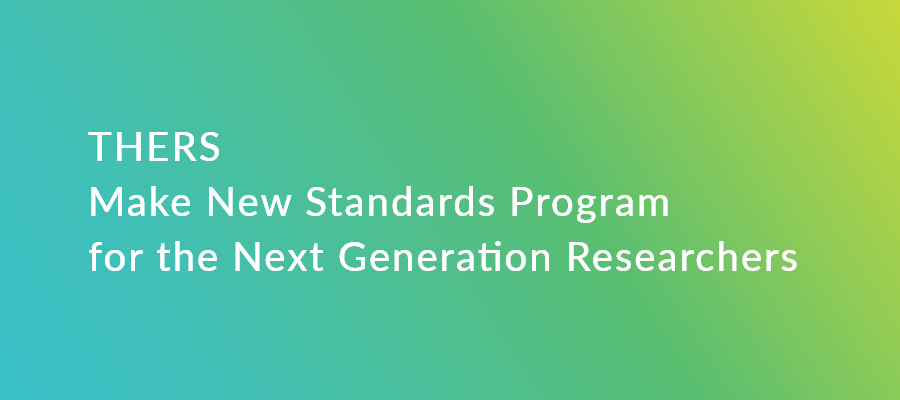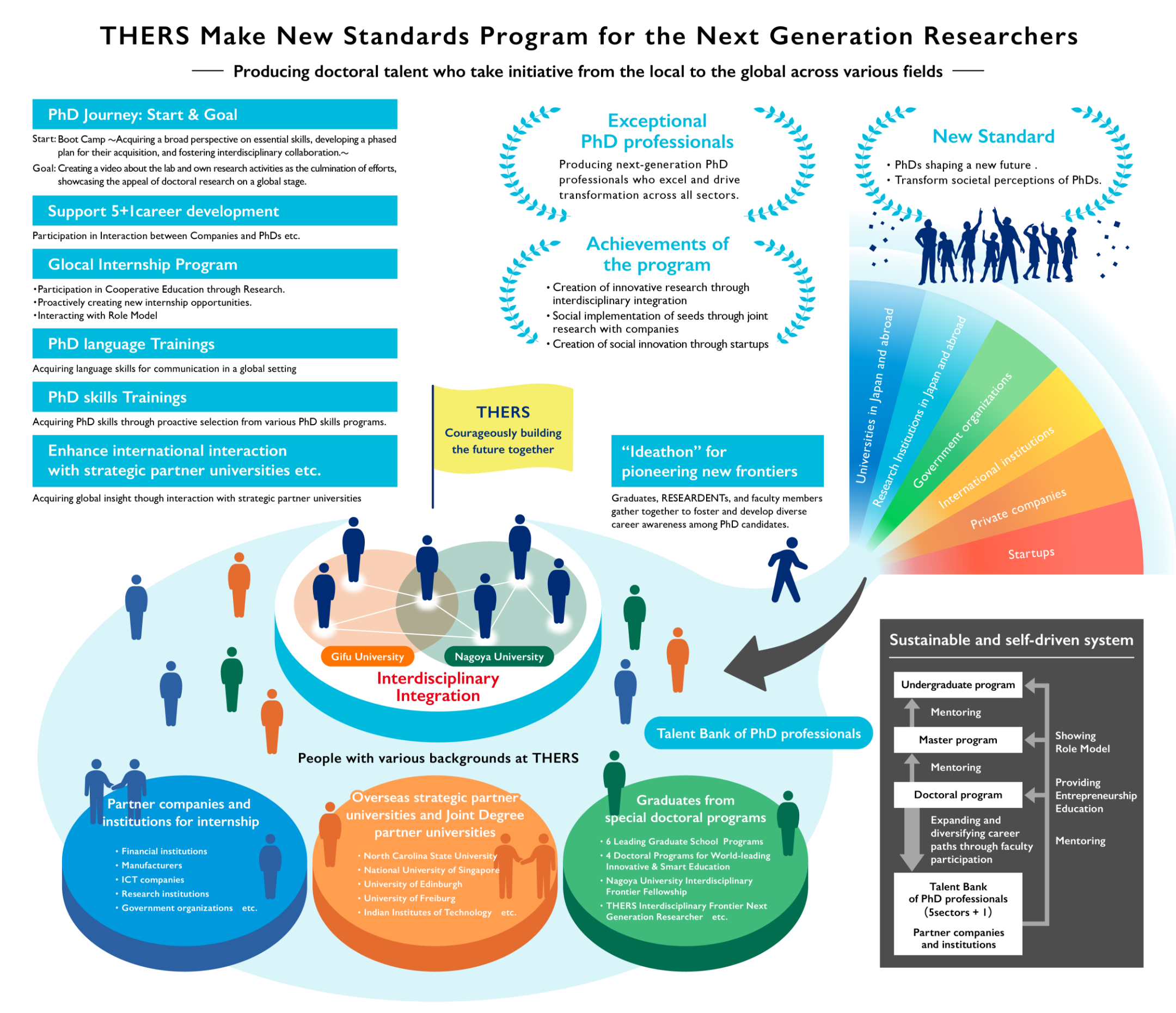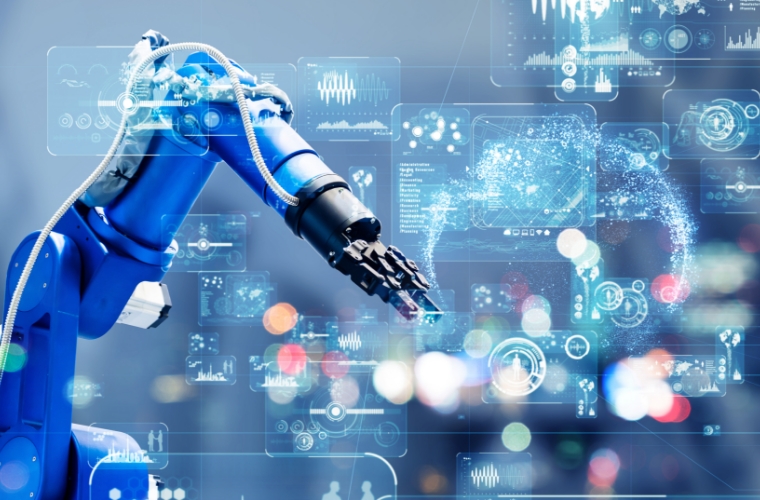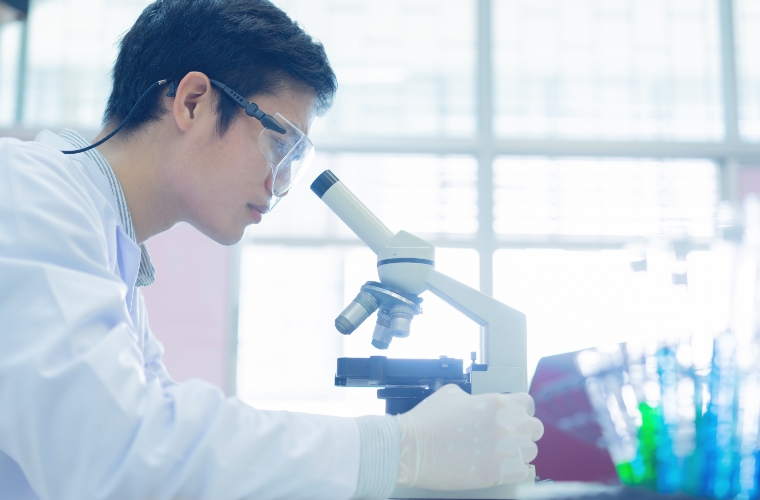
THERS Make New Standards Program for the Next Generation Researchers (hereinafter referred to as the “Program”) aims to develop doctoral human resources who will contribute to future society in various ways, such as taking leading roles in a knowledge-based society or resolving the issues facing the world and Japan. PhD students are already at the forefront of research and supporting the foundation for research at the University.
The Program will provide financial support to such excellent students and thereby provide them with an environment in which they can devote themselves to their research. In addition, by providing various activities to help them acquire the skills required by companies, etc., and by providing opportunities to interact with graduates of Leading graduate schools and WISE program graduates who serve as role models, the Program seeks to dispel anxiety about employment, etc., and encourage participants to contribute to society by designing their own careers.
What’s more, by interacting with PhD students with different specialties, overseas researchers, mentors with different values, etc., the participants will gain a multi-faceted perspective, expand their human networks, and encourage the development of new research based on original ideas and creation and progress of interdisciplinary research.
The students selected for this Program are to be called “RESEARDENTs” (RESEARcher + stuDENT) because they are both students and researchers. RESEARDENTs are expected to have the humble attitude of a student toward learning, while also possessing a sense of awareness and pride as a professional researcher. There are also doctoral programs such as the WISE Program (in principle, a five-year integrated program that integrates master and doctoral programs) that conform to the above objectives. Experience of such programs will be established as one of the assessment criteria for the Program, and selection will be carried out accordingly.

Field
This program encompasses the following seven fields and aims to cultivate PhD professionals capable of addressing challenges faced by Japan and the world across various domains.
Ⅰ Accelerating Social Innovation Studies

The aim is to cultivate doctoral human resources who can accelerate innovation in future societies from a global perspective by opening up academic research that is integrated across a wide range of research strata, from basic research through to application and social implementation, and contributing to solutions; ultimately, this shall lead to solutions to global issues, including the likes of resource recycling in response to climate change and other global warming-related issues, waste disposal, urban regeneration based on the premise of coexisting with nature, and building peace through the resolution of social inequalities and adjusting conflicts of values.
This covers all research fields necessary for social implementation, from basic sciences such as mathematics, physics, chemistry, biology, earth and planetary science, through to informatics and applied engineering research, including prototypes and devices, as well as economic aspects, ethics and law, folklore, language and psychology.
Ⅱ Chem-Bio Integrated Studies

The aim is to cultivate doctoral human resources who can carve out their own careers by cultivating interdisciplinary fields spanning materials and life sciences, in response to common human challenges, such as environmental issues, decarbonization, declining birthrates and aging populations.
Specifically, candidates will actively engage with Japanese universities, research institutions, national governments, local governments, and companies and develop the motivation and ability to contribute to solving common human issues, either as a specialist who can understand other fields, or as a generalist who also possesses specialist skills.
The aim is to resolve issues by creating innovative products from a higher perspective, covering upstream through to downstream fields, from basic sciences through to application, with a focus on multidiscipline such as electricity and electronics, machinery, informatics, energy, biology, medicine, and agriculture, with a focus on materials science and life science.
Ⅲ Informatics, Bio and Life Science Integrated Studies

Life science and medical science research has brought various benefits to humanity. However, in order to resolve issues that will become more complex in the future, we will need to have doctoral human resources with the ability to think and act from broader perspectives. In particular, knowledge of informatics, such as genetic analysis, interpretation of medical data, and digitalized medical information management, will be increasingly required in the future. To achieve this, we aim to develop doctoral human resources who will be at the forefront of solving various challenges facing the world, based on pioneering and international research.
All research fields related to bio-science are covered, such as informatics, life sciences and medicine.
Ⅳ Lifestyle Revolution based on Transdisciplinary Studies

The aim is to “update lifestyles” for humanity in areas such as mobility, communications, energy & resources, drug discovery, medicine & health, food, education, economics, and policy & politics, based on the development of IT and AI technologies. Doctoral human resources will be developed who will continuously create the knowledge of the future, implement it in society, and play active roles globally.
The aim is to nurture doctoral human resources who will lead and develop a wide range of fields in addition to informatics and engineering, including medicine, environmental studies, humanities & social science, and agricultural sciences, as well as science and mathematical sciences.
Ⅴ Creating the Future of Asia and Pan Pacific

The aim is to contribute to the SDGs and efforts to build a prosperous and vibrant society by nurturing global doctoral human resources who will continuously create the knowledge of the future and implement it in society, with a view to coexistence and development with the countries of Asia and the Pan Pacific.
The aim of this field is to develop doctoral human resources who aspire to solve practical issues in Asia and the Pan Pacific, including global issues such as climate change and food security, population growth, economic development, problems associated with social change, development of social infrastructure, and academic fields that contribute to health, welfare, and peace building, such as humanities, sociology, education, economics, legal systems, science, agriculture, engineering, environment, informatics, medicine, regional development, and international development.
Creating the Future of Asia and Pan Pacific
Ⅵ Glocal Problem Solving Studies

The aim is to develop glocal leaders who can promote the development of sustainable local communities from an international perspective, with the SDGs in mind.
This includes: humanities fields, such as economics and law, with an awareness of the economic and policy frameworks for regional contribution; education fields for nurturing regional human resources; and agriculture, engineering, informatics, environmental studies, and medicine, which contribute to the development of local communities through applied research in science fields. However, the doctoral candidates to be trained will not be limited to Japan alone, but will be oriented toward personnel with versatile abilities that can contribute internationally.
Ⅶ Multi-disciplinary Fundamental Studies

The aim is to nurture doctoral human resources who can return to fundamental principles, grasp the essence of nature, humanity, and society, redefine current problems as problems that can be solved, and seek solutions through innovative and logical thinking. This is based on the belief that real innovation begins by returning to such fundamental principles.
The field is one of basic science with a focus on physics, mathematical science, linguistics, history and cultural anthropology, and the aim is to establish resonance and interdisciplinary research in mathematical theory, space, humanity, civilization, society, life, matter and elementary particles.
